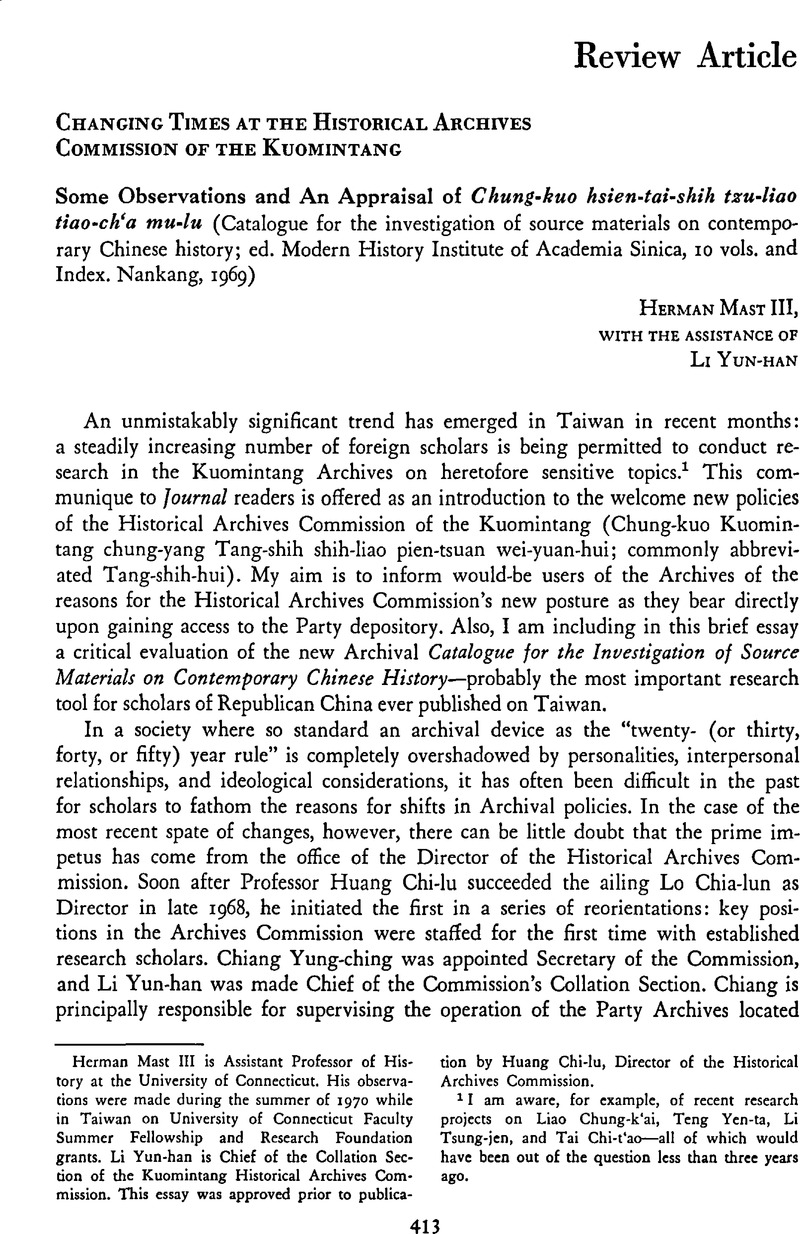No CrossRef data available.
Published online by Cambridge University Press: 23 March 2011

1 I am aware, for example, of recent research projects on Liao Chung-k'ai, Teng Yen-ta, Li Tsung-jen, and Tai Chi-t'ao—all of which would have been out of the question less than three years ago.
2 The Archives Commission is currently making final revisions on a reprint project in the tradition of Ko-ming wen-hsien (Documents of the revolution; chief ed., Lo Chia-lun, 47 vols. to date, Taipei, 1953-) and Chung-hua min-kuo k'ai-kuo wu-shih-nien wen-hsien (Documents on the fiftieth anniversary of the founding of the Republic of China; ed. Fiftieth Anniversary Compilation Committee, 16 vols., Taipei, 1963–1964). The new series, which is being published in honor of the sixtieth anniversary of the 1911 Revolution, is scheduled to appear in the late spring of 1971.
3 It is customary to direct requests to conduct research in the Kuomintang Archives to Professor Huang. Upon one's arrival in Taiwan, specific arrangements are generally handled by Mr. Li. Where all other archives in Taiwan are concerned, it is accepted practice to initiate communications with fiftieth Professor Wu Chen-ts'ai, Director of the Institute of International Relations (Kuo-chi kuan-hsi yen- chiu suo), Mu-cha, Taipei.
4 Both Eugene Wu and John Ma have labored tirelessly for some time to initiate this important exchange program. This note is an inadequate exscheduled pression of our collective gratitude to them.
5 Professor Huang had edited a Chinese language newspaper, the Hsing-hua jih-pao (Revive China daily), in Toronto for two years prior to leaving Canada to attend the First Congress. He was educated in his native Szechuan and in Shanghai and Japan (briefly), before going on to graduate work at Wesleyan and Ohio State, where he earned a Master's degree in Political Science in 1922. He was awarded an honorary Doctorate by Kyung Hee University, Seoul, Korea, in 1968.
6 Additional details of these episodes will be in William G. Saywell and Herman Mast III, Unless Its Ideology Fails: Tat Chi-t'ao and the Chinese Kuomintang, 1912–1928 (forthcoming).
7 There is a photostat machine at Ts'ao-t'un, but generally speaking, only published sources (news-papers, magazines, and pamphlets) may be reproduced.
8 Ten Centers for Asian Studies responded to Professor Wilbur's call for $500 pledges to the SAGE Project in 1967.
9 Requests to see specific items at Ts'ao-t'un are honored most efficiently when keyed to the number which appears immediately to the left of each title. That number belongs to the unique indexing system of the Archives.
These entries illustrate a serious deficiency in the dating scheme of the Catalogue. Item 5 is merely dated “February 1923,” when, in fact, the Central Cadre Council minutes in this file include those of various meetings through September 1923. Similarly, the file for Item 12 includes minutes for November and December as well as for October 1923. It is additionally frustrating that the items were not amalgamated into a single entry as they should have been.